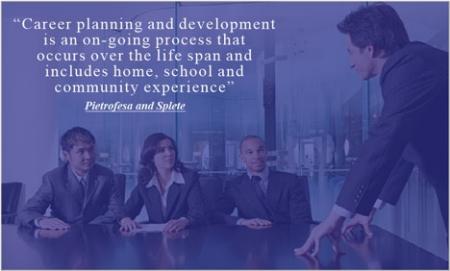Career Planning And Stages By Age: From Your 20s To 70s
Career is an ever-evolving part of human existence. This, in part, is the reason why career experts believe that your career is most likely not to take a straight and narrow path since your goals, skills, and interests may change along the way.
In career planning and development, experts have also broken it down into different stages according to individuals’ age bracket. This, they believe, will help people understand what stage they are in their career and what is expected of them.
In this article, you shall learn about career planning stages from ages 20 to 70, and you shall also learn about the various stages in career development for employees from ages 20 to 70. With an inspiring TED talk at the end, which I hope you’ll love!
What is Career Planning and Development?
Career planning is a lifetime process whereby an individual becomes aware of, finds interest in, gain knowledge and skills in a chosen career path. Career planning and development is an integral component of human development, especially as we begin to form our unique identity, and as our lives evolve.
During the various stages of career planning and development, each stage usually aligns with an individual’s relationships, behaviors, and attitudes, which they exhibit in line with their age bracket. And as they progress from one career stage to the other, with a reasonable landmark, preparations for the next stage follows immediately.
Before we dive deep into the various stages of an individual’s career, first, let’s consider the different terminologies used in explaining career planning and development.
What is a Career?
Career, according to Keith Davis is a sum of all the jobs an individual holds throughout his/her working life.
What is a Career Path?
A career path is the successive pattern of jobs that comes together to form an individual’s career.
What are Career Goals?
Career goals are all the positions an individual strives to attain in the future throughout their career.
What is Career Planning?
Career planning is a series of meticulous steps an individual takes in the selection of career goals as well as the paths that will lead to the actualization of such goals.
You can see an example of this in our article titled: 15 Best Career Paths to follow with a Communications Degree, where we have examples of different jobs the person may have, expected income, and potential growth paths for each.
What is Career Management?
Career management is the process of designing and implementing career goals through planning and strategies that will help an organization satisfy the employees’ needs while allowing them to attain their career goals.

Career Planning and Stages from Age 20 to 70
When it comes to plotting your career path from age 20 to 70, most career advice doesn’t always go as expected for everyone. This is because career advice that helps individual “A” sail through the various stages of his/her career life and still achieve their set career goals may not work or fail miserably for individual “B.”
However, with a few guidelines and pointers, generalization on the best ways to safeguard and make the most from your career can guide and help you through your career at various stages.
Here are some career planning guides and stages to guide you through what to expect at the various stages of your career path about your age range.
Career Planning and Stages at Ages 20s and 30s
Ages 20 and mid-20s is regarded as the onset of career development for career people since this is the point where most of them graduate from college with the eagerness to stand on their feet and be financially responsible for their needs.
Well, despite the eagerness to start a career, most people may flounder, especially when the thought of “what exactly do you want to do?” or “where will you start from?” comes knocking.
Also, there are usually many challenges at this onset stage of a career staring at a young person. The top on the list is generally limited or no working experience, which could serve as an edge to securing a job.
However, amidst such challenges, young individuals usually have some advantages that will get them pushing against all odds, all to ensure that there is a starting point in their career.
Key Things to Pay Attention in your 20s for Faster Career Growth
Firstly, a young individual at this stage most often have no kids or family to cater for, and the few personal responsibilities seeking their attention are usually those they can easily maneuver. So, take the risk of working even for a startup company despite how little the take-home pay maybe.
Secondly, young people can even risk working in an organization where there is no healthcare facility. They are always ready to hop from one job to another job, especially when the grass seems greener than the former. This, you can tell, maybe as a result of little or no responsibility to tie a young person to a job, coupled with a high level of energy to switch sides at the slightest moment.
Nevertheless, young people between the ages of 20 to 30 can also leverage their energy to work for longer hours, take up a few professional courses and risks to ensure that they develop themselves to achieve their career goals.
And while job-hopping from one job to the other is now being seen as ok and professional, young people should be meticulous, methodical, and progress-thinking when making these moves.
Some young people may go through all of these blindly without focus or a goal. Therefore, it’s worthy of mention at this point that young people with the energy to switch jobs at any time should be aggressive with their savings, particularly for rainy days along their way.
Besides having a good savings record, at this stage of career life, young people should also leverage a career counselor’s experience who will serve as a career and professional mentor for them.
Lack of professionalism and naivety of people in their 20s and 30s is expected and it may be overlooked at the onset of their career. However, listening to the advice and wise counsel of trusted professionals and emulating their steps will help you be well-established in your chosen career just as they are.
Career Planning and Stages at Ages 40s and 50s
Although usually regarded as a stage of slight stability in a career, individuals at ages 40 to 50 are usually seen as entering a puzzle or conundrum stage.
At Ages 40 to 50s, individuals are seen to be at the peak of their career, and at this stage, it can be said that professionalism at work will commingle with the passion with which you deliver your job. This is also a stage where your professional expertise places you in the position for an attractive job offer/hire.
Unlike what is seen among the younger age group between ages 20 and 30, the career stage at ages 40 to 50 comes with lots of personal commitments. Top on the list of such personal commitments may include aged parents to support, kids, and school-age children to take care of. All these people may be solely dependent on your ability to secure a job with a steady paycheck for their survival.
In the same vein, at ages 40 and 50, the pattern of hopping from one job to another as seen among younger people gradually begins to decline. At this point, the desire to be steady with a job for a complimentary pay rise becomes heightened.
More so, since tons of responsibilities from mortgages, families, marriage, and even jobs seem to be on the increase every passing day, individuals at age 40 and 50 think it’s high time to stick with their job, which they consider “good enough” at the moment.
While the career stage at ages 40 to 50 may seem to be the perfect time to stabilize, it is also a time many people see as the ideal time to break off from their employment status and start a firm or an organization of their own.
However, this decision is usually backed by the ability to nurture their existing skills, learn new ones, and with some level of professional development that will help them to manage and run their new venture effectively.
To achieve this career goal, most career people in their 40s and 50s see this time as the perfect opportunity to stay active and relevant in various professional associations and attend conferences that will keep them on the same page with trends in their career and industry.
Highly Recommended Next Article:
3 Must-Have Interpersonal Skills for Managers
Another advantage in which career people at ages 40 to 50 can leverage upon to be more successful than the younger ones is the power of networking.
Networking remains a powerful tool that can help people in their 40s and 50s to achieve their branching off from their employment easily.
In some cases where things go awry, and there is a need to go back into job searching, it common for people in this stage of their career to have a quick landing not just by their wealth of experience but also by the network they have maintained throughout their career days.
Just as it is the case today, most top jobs are gotten through some form of referrals or the other. And for an individual who has been working for a couple of years, it then becomes a bit easier to get back on track with a new job since several people within his/her network are willing to vouch for them with a new job.
Career Planning and Stages at Ages 60s and 70s
At ages 60 to 70, most workers are already on the verge of retirement, and they don’t have the luxury of doing so much to keep their jobs, and some may even lose interest in a job if not for the money that keeps coming.
A considerable amount of time, energy, and resources were invested in the career by people in their 60s and 70s. They are most likely to have a rich résumé that can attest to what they’ve achieved over time.
Although many people in this class may still have some energy to work a few more years, their level of energy can never be compared to the burning energy with which younger people in their 20s and 30s relish while working.
But with a handful of experience and the taste of both worlds in their career, older people at ages 60 and 70 are most suited for a consulting job.
With a consulting job, older people can leverage the knowledge and experience they have gathered to guide and proffer professional advice and solutions to younger and middle-class workers.
They usually do this on their terms and pace due to their energy and strength, which are gradually fading away with time.
And for those who are tech-savvy and are still strong enough to offer professional and consulting services at their old age, promoting themselves through various social media platforms (particularly LinkedIn) is one of the best ways to showcase themselves as an expert in their chosen career jurisdiction.
The next point of discussion is Stages in Career Development for Employees at different phases of their career. Before digging into that, let me add below some of the top related and interesting articles that can add to what you’re learning from this one. If any of the titles picks your interest, please click and open in a new tab, so you can check them out later. Enjoy!
-
8 THINGS YOU CAN DO TO ACE ANY JOB INTERVIEW

The happiness when receiving a call marking the job interview gives rise to endless anxiety. After all, it’s only a few minutes to prove your worth, impress the recruiter and seize the opportunity. However, to do well at the job interview, you need to think about what you will say, how you will present yourself,…
-
An Easy Guide to All 15 Types of Speech

We keep learning that there are three types of speeches, informative speeches, persuasive speeches and special occasion speeches. However, I believe and know that there are many more such as debates, motivational speeches, forensic speeches, impromptu speeches, eulogy, and so on. Here’s a growing list of over 13 types of speech and tips on how…
Stages in Career Development for Employees from Ages 20 to 70
As mentioned earlier, workers at different stages/ages of their career life have different roles to play, and these roles are formed partly due to their level of experience in the trade.
In this regard, it then becomes pertinent for an organization to set up various formal approaches to help employees attain the full potentials of their career goals as they work.
Better still, put it this way; stages in career development by an organization are those activities put in place by an organization to help their employees meet current and future demands from their jobs.
This approach is usually considered to be a win-win approach for both employers and employees. This is so because employees can develop and equip themselves to meet their career goals and the organizations. On the other hand, organizations enjoy superior performance, a high level of motivation, and commitment from their employees. This, in turn, adds a reasonable amount of value to the overall growth of the organization.
However, while such career development policies and approaches are best for employees, it is important to note that at each level or stage of an individual’s career, their career needs tend to differ from what the next employee in another phase of their career needs.
For this reason, it then becomes essential that career development strategies and interventions should be integrated in such a way that they meet the specific career needs of employees per time.
Below are the various career development stages for employees at different phases of their career life.
4 Career development Stages for Employees at Different Phases of their Career
1. Career Establishment Stage
This is the stage of inception of an organization, and there is usually a high number of employees joining the firms with a high level of expectations about their career goals.
Such a high level of expectations from the organization are usually heightened when employees receive some exciting news about an organization through peers, company advertisement, some business magazine, etc.
Once employed or absorbed to join the organization’s workforce, and the exciting news about the firm, which was a motivating factor why they had an interest in joining the organization, turned out to be empty promises, employees may be faced with reality shock.
Such shock from the reality of things in an organization may lead to a reduced level of motivation to work, a sliding performance at work, and overall turnover. Thus, it is expected that organizations and companies give the most precise and sincere information about their job and the organization.
On the flip side, for an organization that is true to its brand and advert message, new employees will be put through series of career development tests to open up their skills and knowledge about their chosen career. Some of such career development strategies for new employees include;
- Job Pathing
In job pathing, new employees are scheduled to move from one section of their job assignment and allocation to the other to widen the sphere of their knowledge, skills, and competence in their chosen career.
In doing this, employees are usually moved through different jobs with increasing levels of challenge and responsibility.
With such scheduled training and simulation, the organization will be able to assess each employee’s strength and ability.
Also, an employee’s assignment to a different level of job assignment with an increasing level of responsibility and challenge should be done based on performance, not just by the length of time spent by an individual employee.
- Performance Feedback and Employees’ Coaching
With regular performance feedback, employees are allowed to know their current rating and performance in their job schedule and assignment.
With this, an employee will be able to know his/her position in case there is an opening for higher responsibilities with an added advantage either in terms of a pay rise or other forms of entitlements.
For employees with a poor or low level of performance over some time, the organization can make proper arrangements for some form of coaching or remedial training to boost such employees’ performance.
With this, you can tell that performance feedback is a vital component of career development by an organization, especially when important decisions are to be made.
2. Career Advancement Stage
With results of performance from employees in the establishment stage, the advancement stage is designed to push and develop employees who desire to occupy top positions within the organization.
However, such position doesn’t come by mere wish or desire, but through a high level of competence and skills in one area of job allocation or the other, in which an employee must have handled. Sadly, the advancement stage is usually designed for employees who are under age 40.
In the advancement stage, these highly competent employees are usually deployed to various locations where the organization is situated for them to gain a wide sphere of exposure, knowledge and skills in the trade.
- Mentoring
Through mentoring, employees are allowed to have a close rapport with other superior officers in the organization who will serve as mentors to give career advice and support to the employees.
It is usually the mentors’ responsibility to ensure that employees under their supervision and tutelage who have displayed a high level of skill advancement and hard work are rewarded appropriately.
- Dual Career Accommodation
This is a stage where it is expected that highly productive employees in an organization are likely to take up more responsibilities in terms of marriage. And as it would be expected, such added responsibilities such as childbirth, wedding, spouse relocation, or even child care are likely to interfere with an employee’s job delivery and career development.
For this reason, an organization may deem it fit to introduce some initiatives such as part-time jobs, flexi-time, crèche seat relocation to help an employee juggle other pressing responsibilities without interfering with their job or career goals.
3. Career Maintenance Stage
This stage of career development is usually designed to cater to the needs of employees who have attained the highest possible rank in their job or career. For such category of people, the organization will make the following provisions for such officials;
- Job Rotation
Job rotation is an important career developmental strategy for employees who are in their mid-career stage and have shown a proven performance level in different responsibilities and skill variety.
For this reason, such employees deserve to be moved to new areas within their job jurisdiction where there are bigger challenges with the opportunity for them to learn new skills in their career.
With this, the organization can adequately handle issues bordering around the loss of motivation by employees. And for middle-class employees who have risen to the ranks of managers, they can be given overseas and cross-functional assignments to boost and develop their skills in their career.
- Development Training
Employees within an organization who have risen to the highest possible positions with a proven record of experience in the trade can be engaged to develop and train other young and inexperienced employees.
With such highly skilled individuals in an organization, a regular in-house training program can be arranged to sharpen all the employees’ and participants’ coaching skills and expertise.
- Mentorship
To boost younger employees’ skills and knowledge in an organization, mid-career managers can be engaged to serve and act as mentors or role models that guide and direct younger staff. With this, younger employees in their 20s and 30s can learn and develop themselves through older employees’ knowledge and experience.
4. Career Withdrawal Stage
This is the stage where advanced employees in their 60s and 70s in an organization begin to step aside for employees in the mid-stage of their career to step in to pilot the affairs of the organization. In doing this, older employees may take up different roles as they gradually step aside. Such roles include;
- Consultative Role
The consultative role is best suited for employees in the later stage of their career, and this role is quite different from the role of a mentor within an organization.
As a consultant, older individuals who have step aside from their regular paid employment now function to handle complex problems or projects in an organization.
This role is quite different from mentors’ role in an organization who is mainly saddled with helping and guiding younger employees and managers to grow in their careers.
- Phased Retirement
In this case, employees in their 60s and 70s who are very close to retirement may be given the privilege of a lesser workload, job-sharing assignment, a flexible working schedule, part-time, or even a reduced number of working hours within the organization.
With this, the reality shock of sudden retirement or withdrawal from a job for older employees is reduced, and with this, they can gradually stand down emotionally from the activities of the organization.
Average Salaries by Age Groups
The salary you take home depends on your education, level of experience, cost of living, salary negotiation skills, and industry. So, if you are planning your career and trying to benchmark or predict what level of income you should have or will have in your 20s, 30s, 40s, 50s and up to your 70s, then check below some insights.
In the U.S. the average annual salary by age group can be found below:
| AGE GROUP | SALARY |
| 20-30 | $29,796 |
| 30-40 | $53,378 |
| 40-50 | $59,254 |
| 50-60 | $58,084 |
| 60-70 | $54,808 |
Reference: The average Salary by Age in the U.S. (SmartAsset)
If you are thinking of ways to benchmark your income against the median income in then use this income percentile by age calculator.
Jacob Morgan’s TED Talk on how to future proof your Career is a funny yet educational piece to inspire you to plan your career and fast track your growth.









